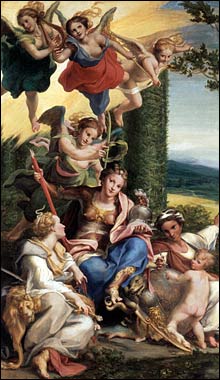|
|
|
|
 | Earl of Rochester |

Correggio. Allegory of Virtue, c1530.
A S O N G.
I.
To this Moment a Rebel, I throw down my Arms,
Great Love, at first sight of Olinda's bright charms:
Made proud, and secure, by such Forces as these,
You may now play the Tyrant as soon as you please.
II.
When Innocence, Beauty, and Wit do conspire
To betray, and engage, and inflame my Desire;
Why should I decline what I cannot avoid,
And let pleasing Hope by base Fear be destroy'd?
III.
Her Innocence cannot contrive to undo me,
Her Beauty's inclin'd, or why should it pursue me?
And Wit has to Pleasure been ever a Friend;
Then what room for Despair, since Delight is Love's End?
IV.
There can be no Danger in Sweetness and Youth,
Where Love is secur'd by Good-nature and Truth:
On her Beauty I'll gaze, and of Pleasure complain;
While ev'ry kind Look adds a Link to my Chain.
V.
'Tis more to maintain, than it was to surprize;
But her Wit leads in Triumph the Slave of her Eyes:
I beheld, with the Loss of my Freedom before,
But hearing, for ever must serve and adore.
VI.
Too bright is my Goddess, her Temple too weak:
Retire, Divine Image! I feel my Heart break.
Help, Love, I dissolve in a Rapture of Charms;
At the Thought of those Joys I should meet in her Arms.
|
Rochester, John Wilmot, Earl of. The Works of John Earl of Rochester.
London: Jacob Tonson, 1714. 24-5.
Site copyright ©1996-2012 Anniina Jokinen. All Rights Reserved.
Page created by Anniina Jokinen on September 24, 2012.
|
|
|